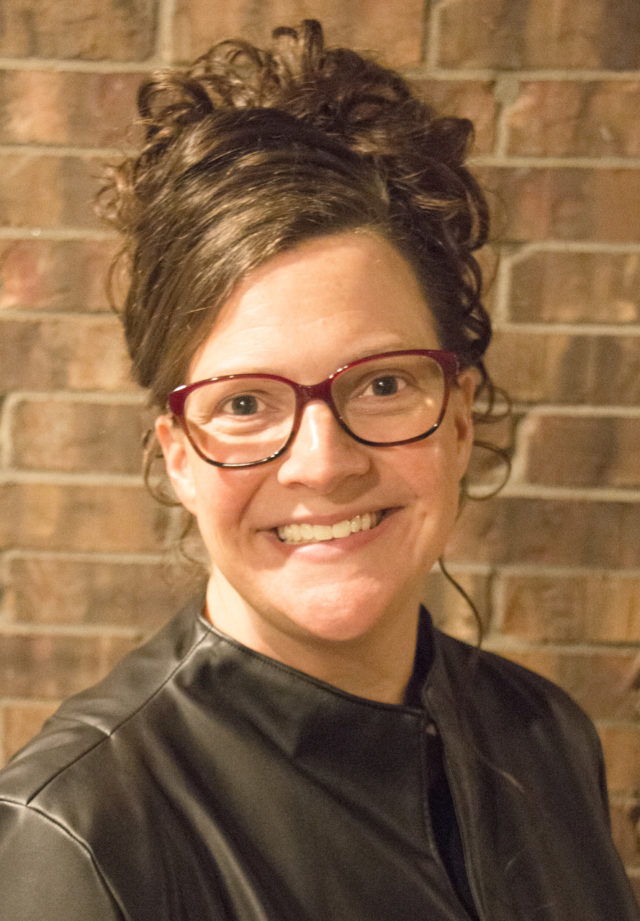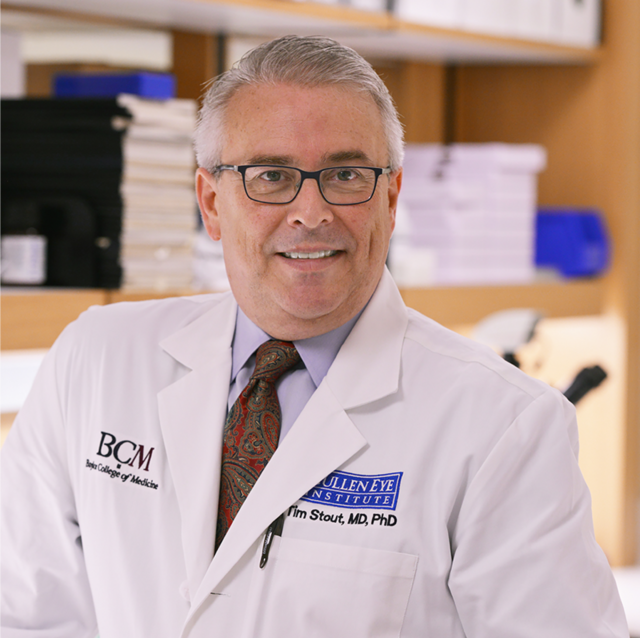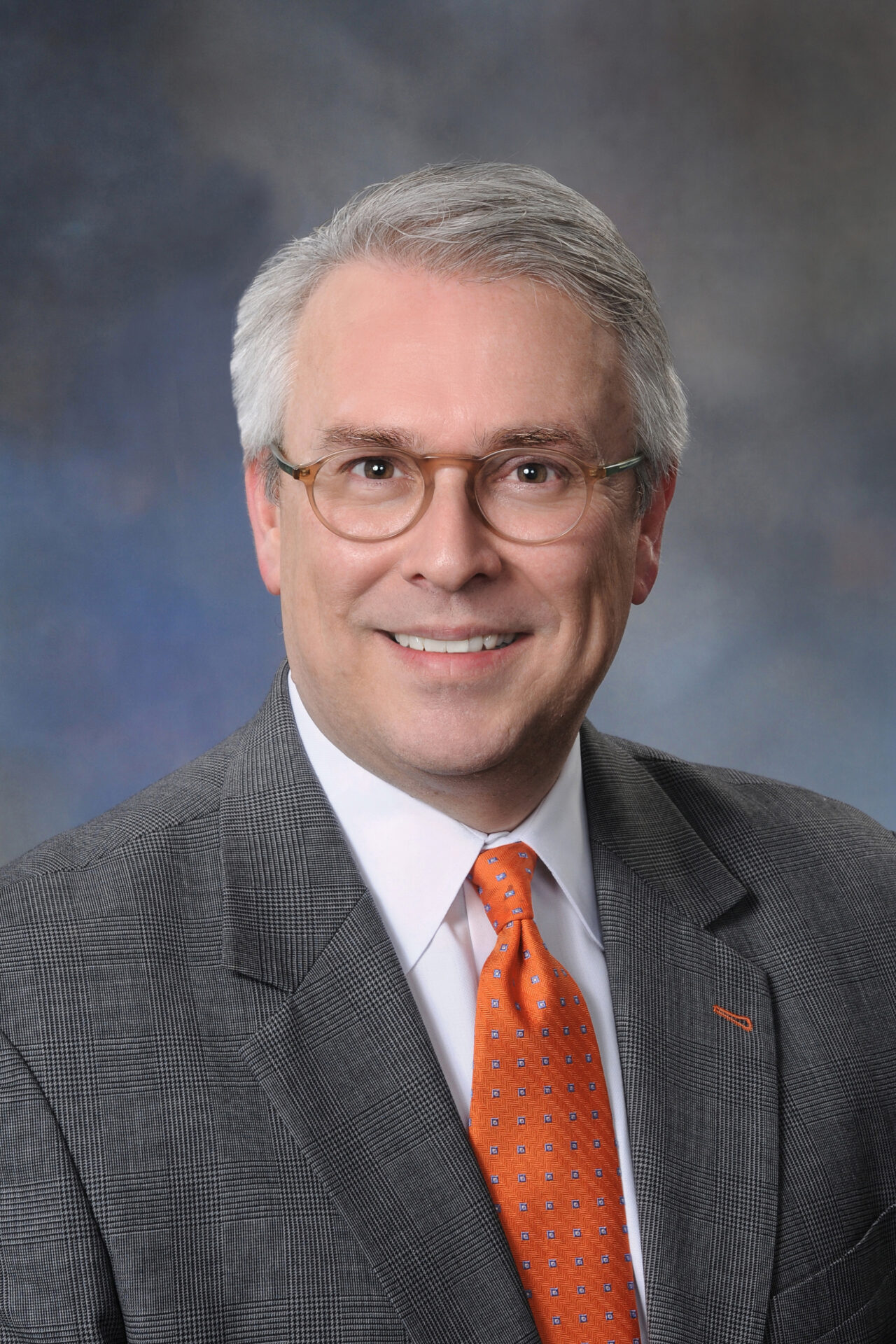 BY MINDI SZUMANSKI, Publisher & Editor, Medical Journal – Houston
BY MINDI SZUMANSKI, Publisher & Editor, Medical Journal – Houston
Giving sight to the blind
“You are blind.” That is something no one wants to hear—much less live. From the beginning of time, these three words have wreaked havoc on their numerous victims by stealing their sight and robbing their freedom. Blindness has put untold millions of people in the prison of darkness and left them without a shining light of a cure.
Not anymore. Thanks to Dr. J. Timothy Stout, the light of a cure now emerges, and many people who were once blind now see. In fact, because of Dr. Stout’s efforts, many who would have been blind have received interventions that either cured or protected their vision. This makes for a very rewarding life, evident in Dr. Stout’s enthusiasm. After all, Dr. Stout wakes up each day knowing that his work at the office helps illuminate the world with the gift of sight—a gift not to be taken for granted.
One may wonder, “How does Dr. Stout obtain such impressive results?” The answer lies in the enormous shift in translational research that Dr. Stout has observed during his tenure. This research is not just translating into symptomatic treatments but creating actual cures. For example, Dr. Stout is on the frontlines of a revolutionary new treatment for patients with a mutation of the RPE65 gene. By surgically injecting a correct copy of the gene behind the retina, sight is restored for those blind since birth or infancy. Imagine the lives of patients impacted by this treatment, being in darkness and told there is no hope for twenty or thirty years and then suddenly regaining sight.
Notably, however, Dr. Stout did not achieve such astounding accomplishments by himself. He credits his inquisitiveness to his mentors: his father and Dr. Thomas Caskey. His father was his best friend and encouraged him to ask questions at a very early age, while Dr. Caskey encouraged him to ask the right questions from a scientific level and how to interpret data properly. Likewise, he ascribes his inquisitiveness from a clinical standpoint to Dr. Steve Ryan, a Retinal Specialist and the Dean of the School of Medicine at the University of Southern California. Dr. Ryan encouraged him to inquire about the absolute wonder of the retina, including how this magnificent member of the body is organized and how it functions. These mentors did not merely infuse facts into Dr. Stout’s life but instilled a mindset for perpetual growth and discovery.
Dr. Stout also attributes his success to the brilliant people he is fortunate to work with on a daily basis. He is proud of the work that they accomplish together. He talked about the work of Dr. Ronald Gross, Dr. Yvonne Chu, and Dr. Christina Weng. Together, they have prevented thousands of cases of blindness in the Harris Health System by installing retinal scanning equipment in the field where this at-risk population retrieves their diabetic treatment. These scans, backed by impressive artificial intelligence algorithms, can identify issues at early onset and help prevent blindness before it is too late.
As the Chair of Ophthalmology at Baylor College of Medicine, he oversees many different divisions. He trusts those divisions to be experts in their specific fields and empowers and equips them to make decisions. His leadership style fosters a purpose-driven culture of collaboration and exploration. Patient outcomes are king, and he has a genuine nature to honor and respect all people, which makes his colleagues feel celebrated and not just tolerated.
According to Dr. Wei Li, a Professor of Ophthalmology at Baylor College of Medicine, “Dr. Stout strongly supports ophthalmic research, including basic and translational research. He regularly hosts research faculty meetings to discuss research-related issues. He is also a principal investigator for an active NIH-funded research grant to investigate inheritable retinal diseases. I am very grateful for his support of our translational research of developing novel therapies to treat proliferative retinal diseases. Of all the Ophthalmology Chairs I know, Dr. Stout is the most supportive of vision research.”

Moreover, Dr. Douglas Koch, a Professor, and Allen, Mosbacher, and Law Chair in Ophthalmology at Baylor College of Medicine, further stated, “Tim continually amazes me with how much he knows, how much he accomplishes, and how much he cares. He is equally engaged whether tackling the most complex research or administrative challenge or explaining something very basic to a student just beginning to learn ophthalmology.”
Dr. Stout advises other physicians, “Understand that you’re the servant of your patient. You’re not there to make a lot of money. You’ll do okay. You’re not there to become famous. You might. But great physicians understand from the get-go that they are the servants of their patients, and all of their decisions should be made to best serve their patients. Sometimes that involves educating the patient. Sometimes, that involves crying with the patient, and sometimes that involves surgery. It’s most important that we understand that we are the servant of our patients.”
You can see from the expressions on Dr. Stout’s face that he is not driven by power or bureaucracy but by people. Regardless of the positions he holds, he holds true to his core values.
That is evident from Rinki Ratnapriya, Ph.D., Assistant Professor, Department of Ophthalmology, Baylor College of Medicine, who explained, “As the chair of the Department, Dr. Stout has been a tireless advocate for advancing research. His vision of bridging clinical and basic sciences to promote translational research is truly remarkable. On a personal level, Dr. Stout has been a great mentor and cheerleader in my academic journey. From the beginning of my time at BCM, he took the initiative to mentor me and provided unwavering support in every aspect. I am grateful for his belief in my abilities and valuable guidance, as they have played a pivotal role in my professional growth. I am proud to serve BCM under Dr. Stout’s exceptional leadership.”
Dr. Stout’s powerful journey started, however, when he received a bachelor of arts degree from Rice University in 1981. Subsequently, in 1987, he received his doctorate in molecular genetics, followed by his medical degree in 1988–both of which were from Baylor College of Medicine. Then, in 2006, he graduated with a master’s in business administration from the University of Oregon. On top of his degrees, Dr. Stout has a plethora of awards, appointments, patents, clinical trials, and research to his credit.
Moreover, by completing fellowships in both retinal diseases and human genetics, his curiosity and desire to serve his patients drive him to discover the molecular biology of the diseases causing his patients to lose their vision.
In addition to his large leaps in the medical world, Dr. Stout is a proud husband and father. His wife of 37 years, Ann, is a retired pediatric ophthalmologist and one of the reasons he chose to pursue the specialty of ophthalmology. They have three grown children. His oldest son is completing his fellowship in urology. His middle son is finishing his doctorate, and his daughter is finishing her college degree. Dr. Stout loves traveling and cooking and was even accepted to Le Cordon Bleu London during his retinal fellowship but ultimately opted not to attend. The culinary world’s loss was healthcare’s gain.
Overall, Dr. Stout has lived a full life. Most tellingly, though, he is giving life, and we are sure his work will continue to do what was previously unthinkable—give sight to the blind.


